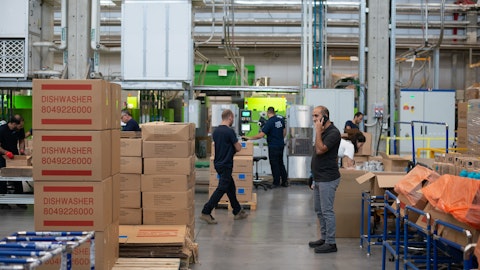Andrew Cox: Oh, sorry, making sure you got me. Hey, I just wanted to get any color on hiring and retention, acknowledging that the facility managers are still lacking necessary IT systems to react as rapidly as you’d like. I just kind of want to know if there’s been any impact of tens of thousands teams that are becoming available on the market has been easier to add post-yellow and do you feel you need to add and need to manage the target of 26,000 shipments per day next year? Thanks.
Alain Bedard: No. We don’t need to add any management, that’s for sure. And your question is really a good question and we can’t really answer that. So those managers have not been trained in managing costs, right? So that’s what we’re going to do in ’24. Once we provide them the financial information, we’re going to train them. Now, if you ask me what’s going to be the success ratio of those managers that have never done that hard to say. So we know one thing for sure is that it’s not going to be a 100%. So we will have guys that are going to make it and probably we have guys that are not going to be able to make it and pass the test of being able to manage costs. It’s a transition year for these guys over the course of ’24.
And to tell you what the success ratio is going to be, I don’t know, okay. One thing we know is that they’ve never done it before, so we’ll see how good these guys could be. Now listen, I mean, if you look at TForce Freight two years ago and TForce Freight today in terms of the executive, Paul, the President, has retired. The pricing guy, David Myers, has gone away. Eileen, the sales leader, has been replaced, okay. So the fleet managers, okay, is new. So at the top level, we have a lot of new blood here new [indiscernible] clean right. And you know if we need to do the same kind of adjustment in the people at the terminal level, that’s what we’ll do.
Andrew Cox: Okay, Alain, that’s very helpful. Thank you. Can I just ask you a bit about the volume churn? There was some intra-quarter swings throughout the quarter, and I just wanted to know if that — if you think that was more a function of just normal seasonality or is this more a function of yellow freight finding a home? We’ve heard from other executive teams that there’s been kind of waves of yellow freight go from one carrier to the next depending on service levels. Just wanted to get a sense of whether that’s functionality of seasonality or finding a home for yellow freight. Thank you.
Alain Bedard: I think that we’ve said it. I mean, day one, the shippers, okay, they go wherever they can. And then they start reacting. And that is probably, I don’t think that is seasonality so much as just shippers trying to find a home where they feel that it’s a better deal for them.
Andrew Cox: Thanks, Alain.
Alain Bedard: Pleasure.
Operator: The next question comes from Benoit Poirier of Desjardins Capital Markets. Please go ahead. Benoit, your line is open, please go ahead.
Benoit Poirier: Okay. So, sorry, Alain, I was on mute. So just looking back at US LTL to get toward the 80%, 85% OR longer term, just wondering if you need to get rid of a railroad similar to the best-in-class players in the US? And what about the pricing and the service these days?
Alain Bedard: Yeah, good point, Benoit. So for sure, okay, we will do more with the rail, okay, because the service with rail is always an issue and the customer cannot blame the rail, they talk to you, right. So there’s again, I mean, we have to bring our costs of our own fleet down, okay. So then there’s no real benefit to move freight on rail. So this is — there’s two things that’s going to happen. The improved, okay, fleet that now our guys are working, better trucks, okay, that’s number one. Number two, better management, okay, for our line-all provider. I mean, our line-all team, with this new software that we are implementing now, that’s going to be fully implemented by the end of ’23. That’s also going to help us. For sure, I mean, if you look at our Canadian operation, we run road and rail.
And the only reason we run rail is because some customers want it cheap, but they know that their service is never going to be the same. And we have to, you know, fight with the rail because the service is not there. But we say to Mr. Customer, you want a cheap deal? Well, you’re going to live with cheap service, right. US, it’s a little bit different because, you know, customers are not really always saying, I want it on the rail, and then the rail is not successful, they don’t deliver. And then so it’s a transition. Okay. And like you said, the best of class in the US LTL world, don’t use too much rail. So, yeah, it’s the trend that you’re going to see us moving slowly, okay, away from rail as much as we can and to service us through our own team directly.
Benoit Poirier: That’s great. Thank you very much, Alain.
Alain Bedard: Pleasure, Benoit.
Operator: This concludes the question-and-answer session. I would like to turn the conference back over to Alain Bedard for any closing remarks.
Alain Bedard: Well, thank you, everyone, for being on this morning call. We appreciate your interest in TFI International. And as always, if you have any follow-up questions, please don’t hesitate to reach out. Please enjoy your day and we’ll speak soon. Thank you again.
Operator: This concludes today’s conference call. You may disconnect your lines. Thank you for participating and have a pleasant day.
Follow Tfi International Inc. (NYSE:TFII)
Follow Tfi International Inc. (NYSE:TFII)
Receive real-time insider trading and news alerts



